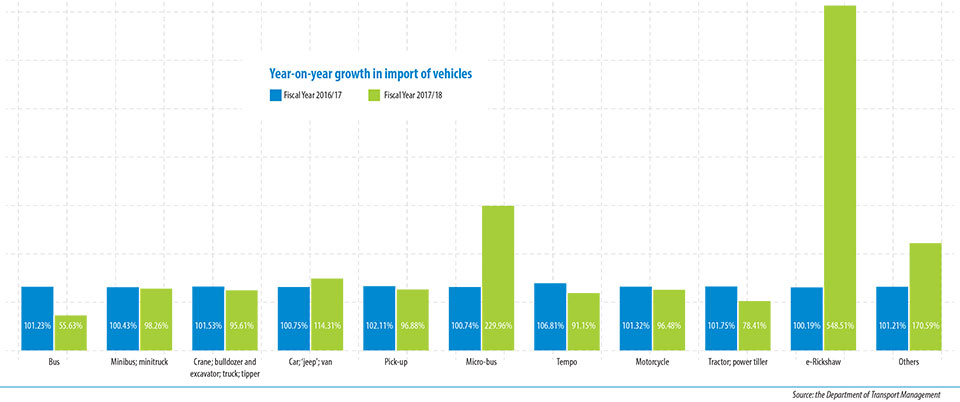
OR
Small vehicle imports surge despite mass transportation push
Published On: September 10, 2018 07:00 AM NPT By: Republica | @RepublicaNepal

e-rickshaw imports up 549 percent
KATHMANDU, Sept 10: The country's small motor vehicle imports have seen a surge despite the government's policy of prioritizing mass transportation.
Motor vehicle imports data of Fiscal Year 22017/18 compiled by Department of Transport Management shows that import of microbus and small vehicles like e-rickshaw increased by 230 percent and 548 percent year-on-year to 1,934 and 12,325 units, respectively, in the last fiscal year ending mid-July.
The continuous growth in import of microbus over the past years is surprising as the Transport Policy of 2001 envisaged switching to mass transportation. The healthy growth in import of small public transportation vehicles and drop in the import of big buses by 55 percent to 2,972 units in the review period substantiates that the import trend is not in line with the government policy.
Overall motor vehicle imports in FY2017/18 recorded a marginal growth of 1 percent to 437,314 units compared to the previous fiscal year.
Consumer right activists attribute the slow growth in motor vehicle imports to end of transporters' cartel as entrepreneurs no longer have to wait for their turn to operate buses. However, a former government secretary claimed the effect of the end of the cartel is yet to be seen.
The government announced the end of any forms of cartel in public transportation in February. The rule came into implementation from the first week of May. But general public has yet to experience the change.
The other factor that affected import of motor vehicles is the tightening of bank lending and high-interest rates, according to traders and officials of the Department of Transport Management.
Import of crane/bulldozer/excavator/truck/tipper declined by 4 percent to 12,154 units in the last fiscal year. Similarly, import of petrol tempos also fell by 9 percent to 16,209 units. In FY2016/17, import of petrol tempos has increased by a whopping 680 percent.
Former Secretary of the Ministry of Physical Infrastructure and Transport, Tulasi Prasad Sitaula, said that the trend of motor vehicle imports goes against the government policy of promoting mass transit as well as the Transport Policy of 2001.
The government recently displaced tempos and microbuses plying the Sinamangal-Gongabu by adding buses under the Kathmandu Sustainable Urban Transport Project. It provided grants (5 percent of total investment) as well as arranged subsidized interest rate of 5 percent for 85 percent of the investment.
Sinamangal-Gongabu is first of the eight routes where the government plans to implement the project.
"If transporters' syndicate comes to an end as anticipated, motor vehicle imports figures will be in line with the national transportation policy,” added Sitaula.
Bishnu Timilsina, general secretary of Forum for Protection of Consumers' Rights, stated that the drop in imports of buses suggest that transport entrepreneurs have realized that syndicate no more exists. "They seem to be looking to make optimum use of their buses. Till May, they were forced to operate their buses as dictated by their association," added Timilsina.
Import of e-rikshaws is rising mainly because rickshaw pullers in southern plains of Tarai are ditching their cycle rickshaw in favor of e-rickshaws. "E-rickshaws have made things lot easier for rickshaw pullers. Their income is also increasing," added Timilsina.
But haphazard use of these e-rickshaws is causing traffic problem on highways and some cities have already ordered them off the highways. This decision has rendered many rickshaw pullers jobless.
“The growing import of e-rickshaws and tempos has no linkage with the government policies. This should be reviewed immediately," Sitaula added.
You May Like This

Woman dies of electrocution while charging e-rickshaw
JANAKPURDHAM, March 26: A woman has died due to electric shocks in Janakpur. ... Read More...




Just In
- MoHP cautions docs working in govt hospitals not to work in private ones
- Over 400,000 tourists visited Mustang by road last year
- 19 hydropower projects to be showcased at investment summit
- Global oil and gold prices surge as Israel retaliates against Iran
- Sajha Yatayat cancels CEO appointment process for lack of candidates
- Govt padlocks Nepal Scouts’ property illegally occupied by NC lawmaker Deepak Khadka
- FWEAN meets with President Paudel to solicit support for women entrepreneurship
- Koshi provincial assembly passes resolution motion calling for special session by majority votes







_20220508065243.jpg)






Leave A Comment